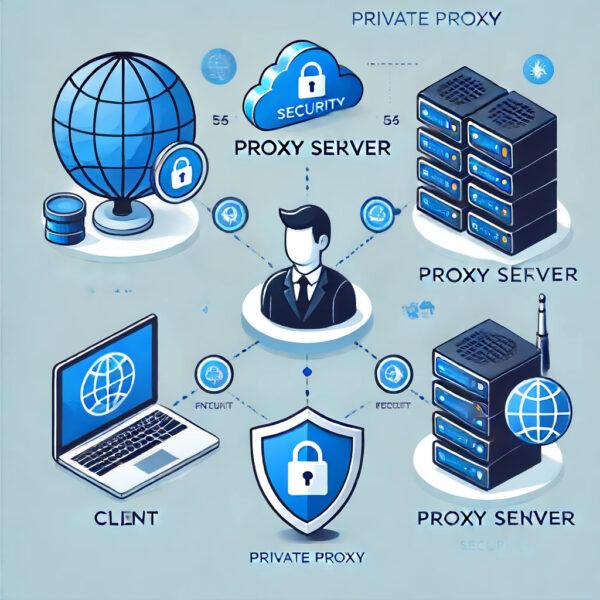In the age of the internet, maintaining privacy, security, and efficient web activity is more crucial than ever. One effective way to achieve these goals is by using private proxies. This article provides a comprehensive understanding of private proxies, detailing what they are, how they work, their benefits, and practical uses. Additionally, we will explore the differences between private and free proxies, guide you on how to choose the right private proxy, and suggest where to purchase them. By the end of this guide, you will be well-equipped to make informed decisions about using private proxies to enhance your online experience.
What are private proxies?
Private proxies, also known as dedicated proxies, are proxy servers assigned exclusively to one user. Unlike shared proxies, which are used by multiple individuals simultaneously, private proxies are used by a single person or entity, ensuring that all the resources and bandwidth are available solely for that user. This exclusivity translates to higher performance, better security, and greater reliability.

Key characteristics of private proxies
- Exclusive use: Private proxies are allocated to a single user, ensuring that no other user shares the same IP address.
- High anonymity: These proxies offer a high level of anonymity, making it difficult for websites to track or block the user’s IP address.
- Reliable performance: With no shared resources, private proxies provide consistent and reliable performance, ideal for activities that require high speed and low latency.
- Enhanced security: Private proxies offer better security features, reducing the risk of data breaches and unauthorized access.
Types of private proxies
- Data Center Proxies: These are created in data centers and offer high speed and low latency. They are ideal for general use but may be easier for websites to detect.
- Residential Proxies: These proxies use IP addresses provided by Internet Service Providers (ISPs) and are linked to physical locations. They are more reliable and less likely to be detected and banned by websites.
How do private proxies work?
Private proxies operate by acting as intermediaries between the user’s device and the internet. Here’s a detailed breakdown of their working mechanism:
- User request: When a user wants to access a website or online service, their request is first sent to the private proxy server.
- IP address masking: The proxy server replaces the user’s IP address with its own IP address. This makes it appear as if the request is coming from the proxy server rather than the user’s device.
- Request forwarding: The proxy server forwards the request to the target website. The website processes the request and sends the response back to the proxy server.
- Response relay: The proxy server receives the response from the website and forwards it to the user’s device. Throughout this process, the user’s original IP address remains hidden.

This intermediary role of the private proxy ensures that the user’s identity and location are concealed, providing a higher level of privacy and security.
Advantages of using private proxies
Using private proxies offers several significant advantages that make them a preferred choice for many users. Here are some of the key benefits:
- High anonymity: Private proxies provide a high level of anonymity by masking the user’s IP address and ensuring that the proxy IP is not shared with others.
- Enhanced security: With exclusive use, private proxies reduce the risk of data breaches and unauthorized access, providing a safer online experience.
- Reliable performance: These proxies offer consistent and reliable performance, as the resources are not shared with other users.
- Faster speeds: Private proxies typically provide higher speeds and lower latency, making them ideal for activities that require fast and stable connections.
- Access to geo-restricted content: They allow users to bypass geographical restrictions and access content that may be blocked in certain regions.
- Reduced risk of IP bans: Since the IP address is not shared, the risk of being detected and banned by websites is significantly lower.
- Better control: Users have full control over their proxy settings and usage, allowing for customization according to their specific needs.
Why do you need private proxies and how are they used?

Private proxies are essential for various online activities across different sectors. Here are some common use cases:
- Web scraping: Collecting data from websites without getting blocked.
- SEO Monitoring: Checking search engine rankings and performance from different locations.
- Ad verification: Ensuring that online advertisements are being displayed correctly across various regions.
- Accessing geo-restricted content: Watching videos or accessing websites that are restricted in certain regions.
- Social media management: Managing multiple social media accounts without risking bans.
- Online gaming: Reducing lag and improving performance by connecting through servers closer to the game’s servers.
- E-commerce: Monitoring competitors’ prices and availability without being detected.
- Market research: Conducting research anonymously without revealing the user’s identity.
- Corporate security: Protecting sensitive corporate data during online transactions.
- Anonymity in browsing: Maintaining privacy while browsing the internet.
In summary, private proxies provide a versatile and powerful tool for enhancing online activities across various fields, ensuring both security and performance.
How do private proxies differ from free proxies?
While both private proxies and free proxies serve the fundamental purpose of masking the user’s IP address, there are significant differences between the two:
- Anonymity: Private proxies offer high anonymity by ensuring the IP address is not shared with others. Free proxies often lack this level of discretion.
- Security: Private proxies provide enhanced security features, reducing the risk of data breaches. Free proxies can be susceptible to breaches and data theft.
- Performance: Private proxies offer consistent and reliable performance due to exclusive resource use. Free proxies can be slow and unstable due to shared resources.
- Support: Paid services offer customer support and troubleshooting, whereas free proxies generally do not provide any form of support.
- Reliability: Private proxies are less likely to be detected and banned by websites. Free proxies carry a higher risk of being blacklisted.
- Scalability: Private proxies can handle large volumes of traffic, making them suitable for businesses with growing online demands. Free proxies may not offer this level of scalability.
Overall, while free proxies might seem like an attractive option due to their cost (or lack thereof), private proxies provide superior performance, security, and reliability.
How to choose private proxies
When you buy proxies, selecting the right provider requires careful consideration of several factors to ensure the service meets your needs. Here are some key points to keep in mind:
- Provider reputation: Choose a provider with a good reputation and positive reviews from users.
- Security features: Look for proxies that offer robust security features, including encryption and regular IP address rotation.
- Speed and reliability: Ensure that the proxy offers high-speed connections and reliable uptime.
- Customer support: Opt for providers that offer excellent customer support to help with any issues or questions.
- Pricing: Compare pricing plans to find one that fits your budget while still offering the features you need.
- Geographical coverage: Check if the provider offers proxies from locations relevant to your needs.
- Trial Period: If possible, choose a provider that offers a trial period so you can test the service before committing.
By considering these factors, you can select a private proxy service that provides the best balance of performance, security, and cost.

Private proxies are a powerful tool for ensuring online privacy, security, and performance. Their superior features and benefits make them an excellent choice for a wide range of applications, from web scraping and SEO monitoring to online gaming and accessing geo-restricted content. By understanding what private proxies are, how they work, and how to choose the right one, you can make an informed decision that enhances your online activities. Investing in private proxies is a step towards a safer and more efficient internet experience.









Leave a Reply